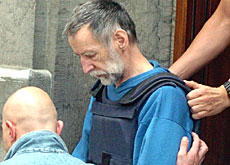
Profiling helps identify serial attackers

Swiss police are using a new psychological profiling system to identify and catch serial paedophiles and killers.
Two cases involving serial child killers in Belgium have demonstrated the need for information sharing among police forces at both national and European levels.
Swiss police nationwide have been using a DNA genetic fingerprint database for the past three years, but it is only since last year that they have had access to a psychological profiling system.
Known as ViCLAS (Violent Crime Linkage Analysis System), the database enables police to determine whether seemingly unrelated crimes have anything in common.
The 15 specially trained officers using the system can then explore the clues to see whether they point to a serial attacker.
Each crime is analysed according to a set of 168 criteria. The system can be accessed at ViCLAS headquarters in Bern or at one of the other satellite centres in Fribourg, Lucerne, Zurich or St Gallen.
So far 500 cases have been entered into the system, with the authorities expecting to add thousands more over the next few years.
Crimes
“In addition to all the information and testimonies, ViCLAS should allow us to eventually establish links between crimes carried out in different areas and at different times,” said Rico Galli from Bern’s cantonal police.
Created by the Royal Mounted Police in Canada, the system is also in operation in Germany, the Netherlands and Sweden.
Most serial murders chose their victims at random, whereas “classic” murders are carried out for reasons directly related to the victim such as financial gain, revenge or jealousy.
It is for this reason that the database could be vital in uncovering essential links from apparently unconnected crimes.
“Each sexual criminal leaves his own ‘signature’ – that is the way in which he carries out the crime,” explained Frank Urbaniok, head of the judicial psychiatric service in the canton of Zurich.
“It’s therefore important to study and compare this information attentively,” he told swissinfo.
History of crime
Another characteristic of sexual crimes is that the protagonists often have a history of offending, mainly starting out with less serious sexual offences or other types of crime.
This was the case with child killers Marc Dutroux and Michel Fourniret.
Dutroux, a Belgian, had a criminal record going back 25 years. He was found guilty of the rape and murder of a number of young girls earlier this year.
Fourniret, a Frenchman, had a conviction for rape in France before he recently confessed to several murders in Belgium.
“Cases of normal people who turn out to be serial killers are generally a myth found in the press or the cinema,” said Urbaniok.
“When one analyses the personal histories of most sexual offenders, one finds that they already have a criminal career behind them,” he added.
The ViCLAS system may have wider applications than only identifying serial attackers; it could also help determine how dangerous a particular individual is, which might stop certain offenders being released too early.
Collaboration
The database also reinforces collaboration and the exchange of information among the country’s 26 cantonal police forces and with other European countries.
The Dutroux and Fourniret cases have led many European countries to call for a European register of convictions to obtain information about past crimes.
Switzerland, having signed up to the Schengen agreement governing cross-border crime, would also have access to the register.
But the Swiss still have much to do at home to catch sex offenders; namely establishing better systems of coordination among the cantons since sex crimes do not fall within the remit of the federal police.
“The gaps in information, such as seems to have been the case between France and Belgium in the Fourniret case, could also happen here in Switzerland, among different cantons,” said Daniel Laubscher from the Federal Statistics Office.
swissinfo, Armando Mombelli (translation: Isobel Leybold-Johnson)
1989: Michel Peiry sentenced to life for the murder of five youths in Switzerland.
1995: The Swiss Werner Ferrari receives life for killing five children.
2004: Belgian Marc Dutroux gets life for the murder, kidnap and rape of young girls in a case that shocks Europe.
2004: Frenchman Michel Fourniret admits to at least ten killings.

In compliance with the JTI standards
More: SWI swissinfo.ch certified by the Journalism Trust Initiative
































You can find an overview of ongoing debates with our journalists here . Please join us!
If you want to start a conversation about a topic raised in this article or want to report factual errors, email us at english@swissinfo.ch.